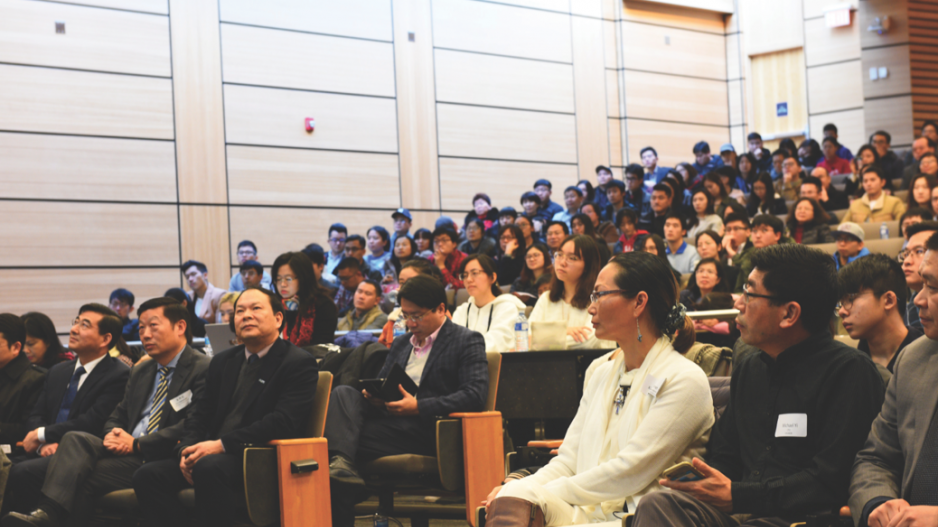With approximately 186,000 Chinese students now studying in Canada, it should not come as a surprise that many want to extend their stay beyond graduation by obtaining work permits, permanent residency or citizenship.
The main challenge, often, is finding a job that will facilitate these longer stays, and students are now increasingly turning to a new avenue – entrepreneurship – to secure a future in Canada.
The level of interest was reflected at a January event at the University of British Columbia (UBC) organized by Wang Guangyu, associate dean of the faculty of forestry and director of the school’s Asian Forest Research Centre. The seminar, aimed at connecting Chinese-speaking students with Vancouver entrepreneurs, drew almost 500 people, forcing organizers to switch venues and close registration early.
“We knew there were a lot of Chinese students who want to find a job here after graduation, but that’s getting quite difficult,” Wang said. “That’s why entrepreneurship is attractive to these students, but up until this point, there’s no one showing them how to pursue starting a business.”
Canada began implementing a startup visa program a few years ago, dramatically shortening the process for entrepreneurs to gain permanent residency. Once an applicant has secured a commitment from a designated Canadian venture capital fund or angel investor group, and meets health, security, financial and educational qualifications, he or she is allowed to immigrate with full permanent resident status.
But while the interest from Chinese students is strong, most of the attendees at the seminar hosted at UBC were woefully unprepared mentally and financially, several presenters said after meeting with some prospective student entrepreneurs.
“Many of the students never thought about how difficult it is,” said Katherine Fan, who in 2010 co-founded Cictan-Biotech Corp., a Burnaby-based company researching health supplements aimed at cancer prevention and overall wellness. “You have to understand the risks. When we started, we went months without paying ourselves salaries, but we affirmed that we’re not going to drop this, no matter how tough it gets. You need to be crystal clear about the situation, because no one’s going to drop from the sky to save you.”
One of the biggest factors determining a student’s startup success or failure is whether a business model works best in Canada or overseas, including markets like China.
“Many of these student entrepreneurs have to decide whether they should stay or go back,” said Alice Wang, CEO of UBC’s student-life online sharing platform UHUBOR. “What is your business? What is your specialty? If you stay, are there specific advantages, and do they outweigh the specific difficulties? Sometimes, if you have a link in China, it makes sense to leverage the resources that come with that link, or perhaps to target the consumers there.”
Michael Day, founder and CEO of Burnaby’s Goopter Holdings Ltd., added that students he met who sought the startup route had the right attitudes for the most part, noting that while they might have lacked knowledge, they were driven to learn and seek partners to make up for shortcomings in their business concepts.
Day added that he urged the students to be flexible in their thinking. He pointed to Goopter, an e-commerce platform that allows startups to launch their own multilingual online storefronts at $350 to $500 per year. It began as a mobile service provider before evolving to meet market needs.
“We found that it was difficult to sell the platform to sellers when it’s only on mobile devices,” Day said. “And we resolved it by identifying, in North America, the need for websites for all businesses, regardless of whether their consumers use a phone, tablet or computer to access the sites. When you have an idea that hits a dead end, it doesn’t hurt to change it a bit and see if there’s a new path.”
Wang, one of several Metro Vancouver Chinese-Canadian professors who founded the Grizzly Bear Institute of Canada think tank, said the group plans on hosting more events and might consider shifting the seminar format to English, given that most entrepreneurial efforts in North America require a level of English competency to survive.
Given the increasing interest among B.C.’s Chinese international students for entrepreneurship, Wang said future seminars will play an important role in cultivating this new potential source of grassroots innovation in Vancouver, and he doesn’t see the trend diminishing in the near future.
“The key for us is that we have to create a network of mentors and students,” Wang said. “We are not looking at this as a one-time thing…. I think, by doing this in English next time, we can potentially get more successful Vancouver startups to come here and participate. One of the key roles we play as educators is to prepare students for the working world, but there are almost no classes on entrepreneurship.” •




